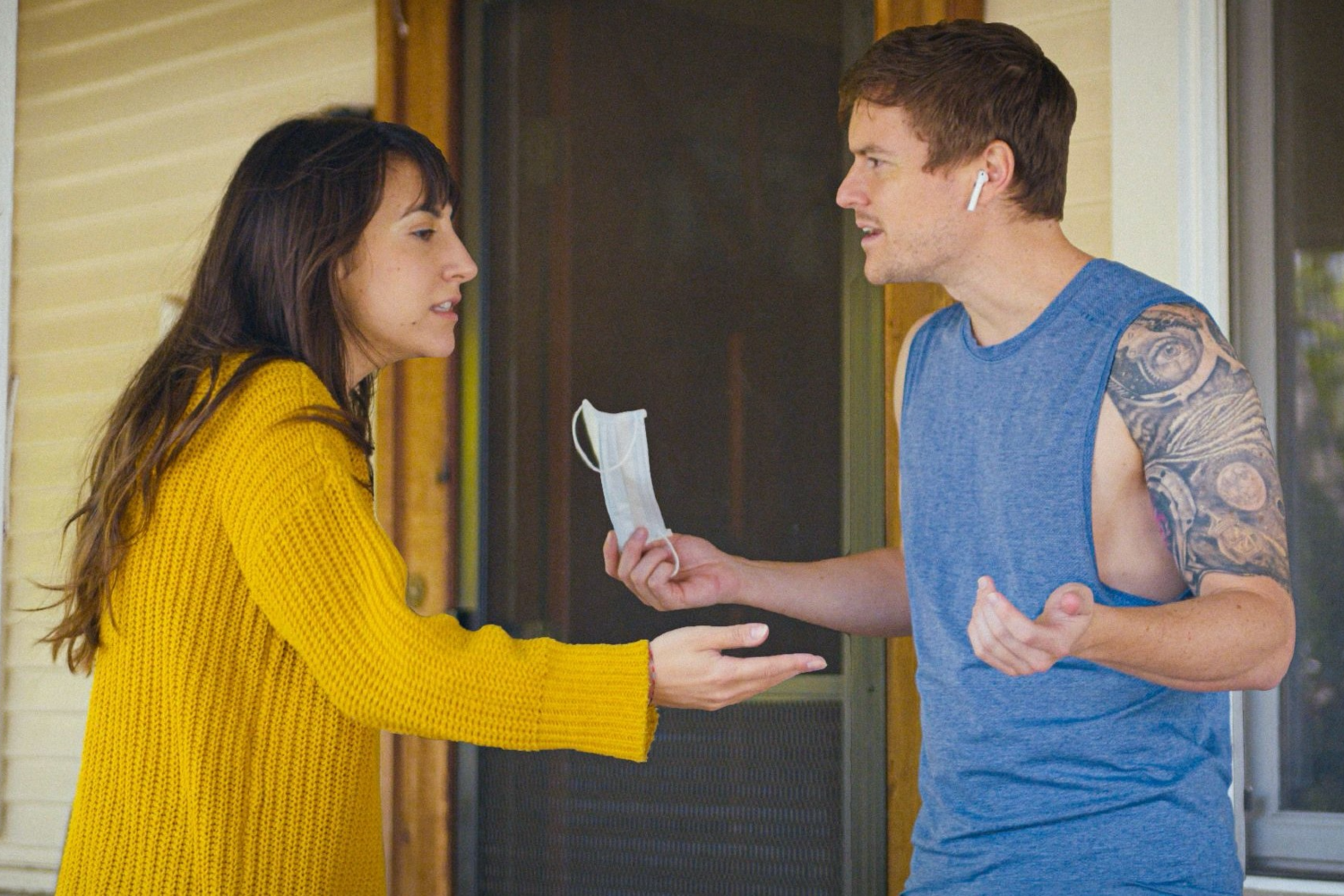What to Watch Verdict
Unfortunately, 'The End of Us' is more interested in being a pandemic movie than a good movie that takes place during a pandemic.
Pros
- +
😷 Those melodica bits are kind of catchy!
- +
😷 There are some REALLY solid COVID gags
- +
😷 The film shows there's going to be a lot of mileage in the unique horrors of pandemic Zoom dating
Cons
- -
😷 Nick and Leah are a deeply unlikable couple, which sorta makes everything else a little tough to pull off.
The End of Us is part of our SXSW 2021 coverage. You can find all of our reviews here.
Being the first filmmaker to capture the cultural ennui of the 2020 pandemic may seem like a dubious honor. Still, when your film is selected for the 2021 South by Southwest film festival, it's an honor you'll accept. So is the fate of Steven Kanter and Henry Loevner's The End of Us, a dramedy that explores what happens when one separated couple is stuck together during a global health crisis.
Leah (Ali Vingiano) has reached the end of her rope. After one fight too many, she's finally called things off with Nick (Ben Coleman), her boyfriend of four years. Heartbroken, Nick accepts Leah's decision—at least until the state of California announces the first round of shelter-in-place orders, leaving him with no place to turn. His friends turn him away, citing COVID concerns. Even his East Coast family politely rebuffs him from returning to Manhattan for a few months.
Leah and Nick try to make it work. As the pandemic lingers on—first for weeks, then for months—the two do their best to be civil, dancing around their known triggers and trying to find new ways to be productive at home. But before long, the loneliness of the pandemic begins to take hold, and the line between companionship and romance blurs. Is their relationship truly as dead as it seems?
Nick is a struggling actor with few practical skills and a knack for the melodica. His keyboard noodling provides The End of Us with one of its primary themes, threaded between scenes as a piece of musical connective tissue. Unlike many couples—whose passions and interests move towards the middle and begin to overlap over time—Nick and Leah seem to still operate independently, outside of a shared taste for bad comedies. And this creates several problems as the film unfolds.
The first problem is the setting. There is a difference between making a pandemic movie and a movie set during a pandemic. For about an hour, The End of Us delights in reminding us of the early days of COVID, cycling through shared cultural experiences with all the subtlety of an Ernest Cline novel. But the more it tries to poke gentle fun at our collective anxiety during the early days of the lockdown, the more the film struggles to make sense of its central (non)relationship. Are we meant to care about Nick and Leah as people? Or they merely the vehicle for a pandemic-based narrative?
In its defense, The End of Us does find its footing as the movie goes on. When the pandemic shifts to the background—and the love triangle between Nick, Leah, and her Criterion Collection-obsessed coworker Tim (Derrick Joseph DeBlasis) becomes the main focus of the film—The End of Us stops being a pandemic movie and starts being a movie set during a pandemic. That allows the COVID jokes to work alongside, not despite, the characters. When Nick and Leah both get tested for COVID, and only Nick is given the invasive nasal swab, it is a throwaway moment that succeeds in underscoring each character's preparedness.
The latest updates, reviews and unmissable series to watch and more!
And therein lies the second problem. Nick Boal and Leah Russo are a disastrous couple, so obviously mismatched from the film's opening moments that The End of Us is constantly fighting uphill to make us care about their romantic prospects. The animosities that Nick and Leah hold against each other develop quietly in relationships over an extended timeframe. Skipping past the breakup to get to the COVID bits prevents us from ever really understanding why the two were together in the first place.
This is not the fault of either Coleman or Vingiano, who do solid work inhabiting the characters they are given. There are rough arcs present for each character—Nick learns that it is OK to make practical decisions in life while Leah learns to manage her anxiety and live in the moment—and both actors find fun moments throughout. But the details of their relationship are sketches so faintly that we struggle to understand why they liked each other in the first place, let alone why they would entertain the thought of reconciliation. And frankly, The End of Us is too slight to make a serious play at the relationship Stockholm Syndrome premise it seems to entertain.
As the first high-profile film of the COVID-19 era, The End of Us's legacy is secure. And with a little bit of distance, the more pressing references to the pandemic will likely win over audiences who are no longer forced to live this reality day in and day out. But no amount of distance will make Nick and Leah a more relatable non-couple onscreen. In the end, perhaps the old adage is true: it's better to be first than it is to be better. A middling dramedy with a killer hook is still more than many independent films have to offer.
Matthew Monagle is an Austin-based film and culture critic. His work has appeared in a true hodgepodge of regional and national film publications. He is also the editor and co-founder of Certified Forgotten, an independent horror publication.


